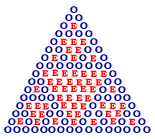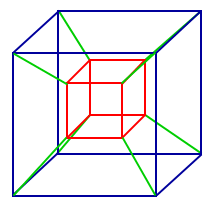
Pascal’s Triangle has many surprising patterns and properties. For instance, we can ask: “how many odd numbers are in row N of Pascal’s Triangle?” For rows 0, 1, …, 20, we count:
row N: 0 1 2 3 4 5 6 7 8 9 10 11 12 13 14 15 16 17 18 19 20
odd #s: 1 2 2 4 2 4 4 8 2 4 04 08 04 08 08 16 02 04 04 08 04
It appears the answer is always a power of 2. In fact, the following is true:
- THEOREM: The number of odd entries in row N of Pascal’s Triangle is 2 raised to the number of 1’s in the binary expansion of N.
Example: Since 83 = 64 + 16 + 2 + 1 has binary expansion (1010011), then row 83 has 24 = 16 odd numbers.
Presentation Suggestions:
Prior to the class, have the students try to discover the pattern for themselves, either in HW or in group investigation.
The Math Behind the Fact:
Our proof makes use of the binomial theorem and modular arithmetic. The binomial theorem says that
(1+x)N = SUMk=0 to N (N CHOOSE k) xk.
If we reduce the coefficients mod 2, then it’s easy to show by induction on N that for N >= 0,
(1+x)2^N = (1+x2^N) [mod 2].
Thus:
(1+x)10 = (1+x)8 (1+x)2 = (1+x8)(1+x2) = 1 + x2 + x8 + x10 [mod 2].
Since the coefficients of these polynomials are equal [mod 2], using the binomial theorem we see that (10 CHOOSE k) is odd for k = 0, 2, 8, and 10; and it is even for all other k. Similarly, the product
(1+x)11 = (1+x8)(1+x2)(1+x1) [mod 2]
is a polynomial containing 8=23 terms, being the product of 3 factors with 2 choices in each.
In general, if N can be expressed as the sum of p distinct powers of 2, then (N CHOOSE k) will be odd for 2p values of k. But p is just the number of 1’s in the binary expansion of N, and (N CHOOSE k) are the numbers in the N-th row of Pascal’s triangle. QED.
For an alternative proof that does not use the binomial theorem or modular arithmetic, see the reference. For a more general result, see Lucas’ Theorem.
How to Cite this Page:
Su, Francis E., et al. “Odd Numbers in Pascal’s Triangle.” Math Fun Facts. <http://www.math.hmc.edu/funfacts>.
References:
George Polya, Robert E. Tarjan and Donald R. Woods, Notes on Introductory Combinatorics, Birkhauser, Boston, 1983.
Fun Fact suggested by:
Arthur Benjamin

